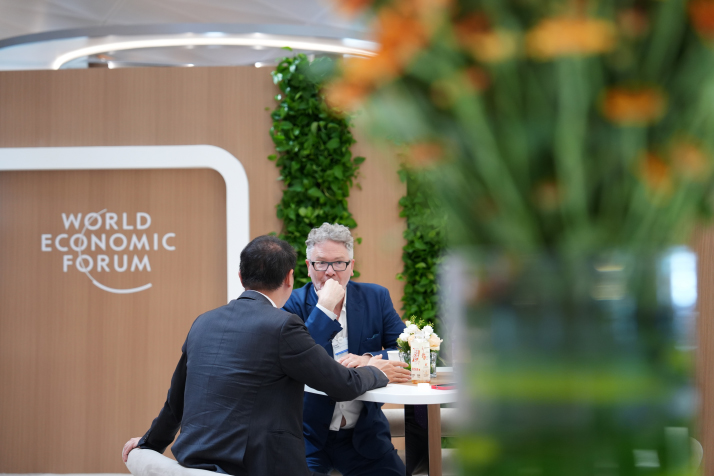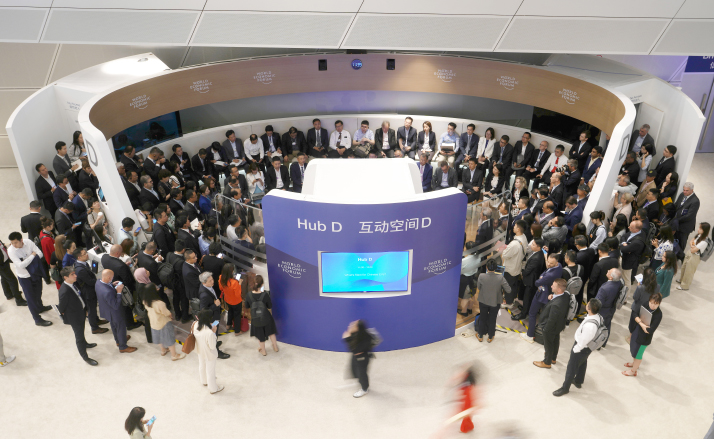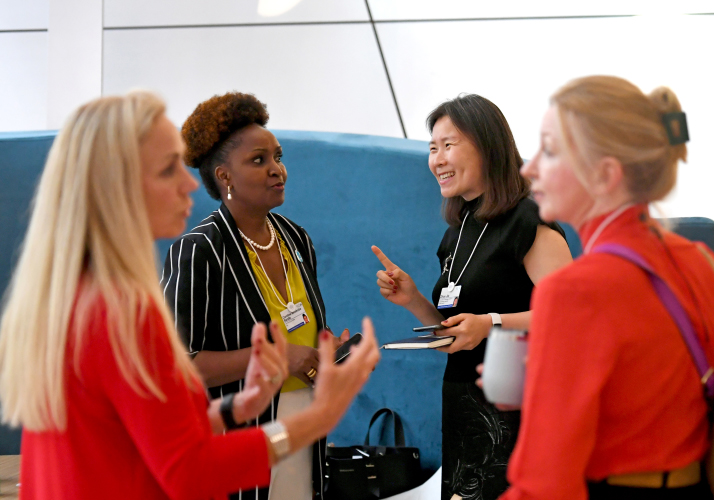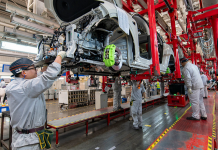
For her, the purpose of this trip was not to find business partners, but to “open conversations.” Hong Vu is the chief executive officer (CEO) of ELSA, a U.S.-based AI-powered educational language technology company. During her stay in Dalian, she met with global leaders from all walks of life, attended several panel discussions, and gained valuable insights through conversations and exchanges.
“Experiences like this are fascinating; you never know what you might gain. There might be new opportunities that may not happen immediately, but could unfold in the future,” she told Beijing Review.
“Since we do global business, it is crucial to understand the world, see how we can connect with it, and know who we can work with. For example, coming here has shown me what needs to be done if I want to do business in China,” she added.
Hong Vu’s reason for attending the Annual Meeting of the New Champions of the World Economic Forum (WEF), also known as Summer Davos, resonates with most of the attendees. Themed “New Frontiers for Growth” this year, the event took place in the coastal city of Dalian on June 25-27, attracting 1,700 representatives from the political, business, academic and media communities in more than 100 countries and regions.

New frontiers
On June 25, Chinese Premier Li Qiang delivered a keynote speech at the meeting’s opening plenary. He said world economic development has reached a critical juncture and the road to recovery has been difficult since the onset of the pandemic. As many people wonder where the future of the world lies, this annual meeting, focusing on “Next Frontiers for Growth,” is particularly relevant.
“To overcome the growth predicament, we need to cultivate new engines for growth,” Li emphasized, adding that as the new round of sci-tech revolution and industrial transformation deepens, global innovation activities in science and technology have become more intensive and dynamic than ever before.
“A number of frontier technologies and industries with the potential for explosive growth are metamorphosing and ready to burst onto the stage. This brings light and hope for catapulting the world economy into a new upward cycle,” he said.
The new frontiers, as Li mentioned, encompass new technologies like cutting-edge information, energy and biological technologies, new industries such as artificial intelligence (AI), green energy, and biomedicine, along with new business models such as online services, C2M (customer-to-manufacturer) customization, and smart manufacturing.
“Although these are new frontier technologies, their development is occurring much faster than we anticipated. Embracing these new frontiers is crucial for addressing uncertainties, as continuous innovation is key to improving the productivity of human society,” Ramses Alcaide, CEO of Neurable, a U.S.-based brain-computer interface technology company, told Beijing Review.
On the same day, the WEF announced the publication of its annual Top 10 Emerging Technologies Report. The technologies, including AI for scientific discovery, privacy-enhancing technologies, reconfigurable intelligent surfaces, high-altitude platform stations, and integrated sensing and communication, are poised to make a positive impact in the world in the next three to five years, said Jeremy Jurgens, Managing Director and head of the WEF’s Center for the Fourth Industrial Revolution.
“Facing numerous challenges such as geopolitical issues, these new frontier technologies give everyone a real focus,” Kieran Donovan, CEO of k-ID, a Singapore-based tech company specializing in safety and privacy-by-design solutions for digital platforms, told Beijing Review. Donovan said Li’s speech impressed him a lot as he emphasized the need for forward thinking to meet global challenges. “It’s essential to establish communication, maintain open communication and mutual respect, and continue dialogue to overcome these challenges,” he added.

China’s opportunities
Hong Vu, Donovan and Alcaide are all innovators at the frontier of their respective industries. For innovators like them, the vast opportunities in China hold strong allure.
As Premier Li mentioned in his speech, in recent years, China has continued to promote high-quality development, accelerate the cultivation of new quality productive forces, and foster new drivers of growth. The rapid rise of China’s new industries is in line with the global trend of sci-tech revolution and green development.
He said China has a super-sized market of more than 1.4 billion people, a complete industrial supporting system, abundant labor force and talent pool, and diverse scenarios for application. Plus, Chinese consumers are comparatively receptive to new technologies. All these make China a broad stage for enterprises to pursue innovation and upgrade their products. The rapid growth of new industries and new drivers has buttressed the sound and sustained development of the Chinese economy.
The Summer Davos serves as a bridge for these global innovators to understand China and establish connections. In their interviews with Beijing Review, innovators like Hong Vu, whether or not they have previously collaborated with Chinese partners, shared an understanding of the country.
Hong Vu recognized China’s determination to become more open to the world, making English communication crucial. She noted its huge market with 1.4 billion people, highlighting that her products are currently downloadable through online channels, with many Chinese users already onboard. Looking ahead, she mentioned considering expanding their presence in China to offer solutions to local businesses.
Donovan is already collaborating with some of China’s leading tech companies, assisting them in expanding internationally. He mentioned that working with them has been very easy, and he is looking to deepen this cooperation in the future, potentially establishing a physical presence in China.
Alcaide said in China, technological aspirations consistently come to fruition, and good innovations are always embraced and applied by the market.
“If a country is proactive in adopting technology, upgrading its technological infrastructure, and effectively commercializing these advancements, it is highly beneficial for stakeholders. This sends a clear signal that the country is open for business,” said Shahrukh Shamim, CEO of EnviCore Inc., a Canada-based technology company focused on transforming mining waste into valuable construction materials.
“Moreover, if a country excels in various fields such as construction, AI, manufacturing, and others, it is evident that we should engage and provide support, leveraging all available means,” Shamim added.
Juan Carlos Escobar, CEO of Aquokit, a Bolivian company who builds greywater treatment technology to drive sustainability and water conservation, said he has been deeply impressed by China’s green commitment to making the world a better place. This green commitment is great news for their startups, as it means there will be many opportunities.
He said their systems are manufactured in Bolivia, but many components come from China. “I am here to understand the Chinese market and bring our solutions here, and I am currently looking for partners to help us enter the Chinese market,” Escobar said.
“Changing the world requires not only great technology but also finding the right people. This is why we are here,” said Mesbah Sabur, founder of Circularise, a Netherlands-based blockchain platform providing digital product passports for comprehensive supply chain traceability and secure data exchange.
He said although his current business is not directly related to China, when it comes to the supply chain, it is more or less connected to China. China’s strong manufacturing sector is becoming increasingly relevant to their business.
“Western media often portray China as a closed environment, but [Summer] Davos has shown me that everyone has an open mindset, embracing Western companies and technologies, which is crucial for collaboration,” Sabur said. “In the past, language was a significant barrier, but this has dramatically changed now. There is no doubt that we will expand our business in China and we’re looking for when is the right timing,” he added.
The rapid growth of new industries and new driving forces has strongly supported the sustained and healthy development of the Chinese economy. China is home to about 50 percent of the world’s wind power equipment, 80 percent of global photovoltaic equipment, and one third of the world’s AI large language models. Numerous figures speak volume that China has become a prominent trendsetter and a second-to-none magnet for related industries amid the trend of exploring new frontiers of AI and new-energy sectors.
Speaking at the opening ceremony, Polish President Andrzej Duda said that China’s contribution to world economic growth has stayed at around 30 percent over the years, and it continues to be a key driving force for global economic growth.

Competition vs.collaboration
“Technology is truly expansive when we work alone, but its power multiplies when we share knowledge,” Hong Vu said. Her statement underscored the critical role of collaboration in fostering innovation—both crucial for fostering growth. “To drive future economic growth, we must embrace innovation and foster collaboration across sectors, regions, nations and cultures to create a more peaceful, inclusive society and resilient future,” said Klaus Schwab, Founder and Executive Chairman of the WEF, in a welcome address to delegates.
Competition and collaboration always coexist as twin dynamics in the international context. Concerning the relationship between the two, Alok Anil, founder of Next Big Innovation Labs, an India-based 3D bioprinting company, told Beijing Review. “The world needs more innovators who, despite competing with each other, ultimately find that collaboration will enhance innovation and make the world a better place. That’s why I am very willing to work with like-minded peers in China.”
Mauricio Benavides is the CEO of Metabase Q, an end-to-end cybersecurity platform for companies in Latin America. He told Beijing Review that as Chinese manufacturing continues to invest in Latin America, synergies between the two regions are growing. However, different countries have varying business regulations and circumstances, and can each leverage their respective comparative advantages through cooperation.
Shamim believed he would meet local competitors while entering in the Chinese market, but “the Chinese market is large enough to offer opportunities for every player.”
“At the end of the day, whichever company is leading will help propel everyone else forward,” Alcaide said.
Premier Li said in his speech, “the depth of international cooperation determines the height of human development.” Resorting to regressive actions of decoupling, disrupting supply chains and building small yards with high fences would only push up operational costs, sever the economic links between regions and aggravate tensions and disputes. This would drag the world into a destructive spiral where the fierce competition for a larger slice ends up in a diminishing pie, Li said.
Then, how should global cooperation proceed? Panelists from various fields are seeking pathways. In the realm of green development, for instance, the Global Battery Alliance (GBA), an organization uniting companies across the battery value chain, engages in initiatives such as mapping applicable regulations and standards that are affecting the global battery value chain.
Inga Petersen, the GBA’s Executive Director, said collaborative efforts are necessary to establish global battery standards. This way, they can help consumers identify quality products and counteract misinformation about issues like battery life and recycling to build consumer confidence on electric vehicle (EV) battery products.
In the AI domain, global AI governance has become a buzzword. Xue Lan, Dean of Schwarzman College at Tsinghua University, told Beijing Review that there may not be a single institution globally, such as the United Nations, capable of governing AI. All stakeholders need to work together, including institutions, governments, businesses and the general public.
Jay Lee, Clark Distinguished Chair and Director of the Industrial AI Center at the University of Maryland in the U.S., said algorithms, big data, and computing represent the foundational elements of AI viewed horizontally.
Lee told Beijing Review that horizontal comparisons of AI are meaningless for promoting international AI cooperation. Instead, it should be approached vertically. This means considering how AI can be applied across various domains, starting with universal sectors like the environment, climate, food security, healthcare, education, and livelihoods. By ensuring technology benefits everyone, individual prosperity translates into national gains. –The Daily Mail-Beijing Review news exchange item





